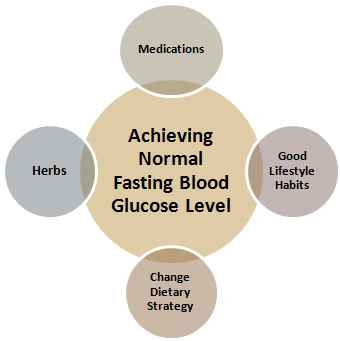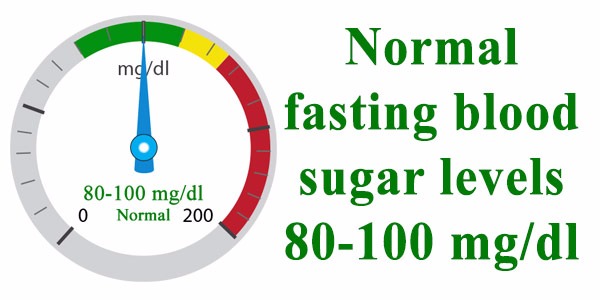- Home
- blood sugar levels
- normal fasting levels
Chart for normal fasting blood sugar levels
Normal fasting blood sugar levels are considered fasting blood sugar levels between 70-80 mg/dl and 100 mg/dl.
However, nowadays, this normal range is changed due to different reference ranges of laboratories use.
These figures come out when you measure your blood sugar level in the morning after have been fasting for at least 8 hours.
This is the time between the dinner and your breakfast. Everything you eat influence your fasting blood sugar level.
What you need to do is to keep your fasting blood sugar levels at a normal range, I.e as lowest as possible.
What is considered normal blood sugar level?
For most adults, a normal blood sugar level when fasting (not having eaten for at least 8 hours) typically falls between 70 and 100 milligrams per deciliter (mg/dL).
This is the standard range provided by many healthcare organizations, including the American Diabetes Association.
However, blood sugar levels can fluctuate throughout the day due to various factors such as meals, physical activity, stress, medications, and individual health conditions.
After eating, blood sugar levels may temporarily rise but should generally return to normal within a few hours.
It's important to note that the definition of normal blood sugar levels can vary slightly among different healthcare providers and regions. For instance, some may consider levels up to 110 mg/dL as normal, while others might define the upper limit as 99 mg/dL for fasting blood sugar.
Additionally, the target range for individuals with diabetes might differ. Generally, for people managing diabetes, target blood sugar levels before meals are often recommended to be between 80 and 130 mg/dL and lower than 180 mg/dL two hours after starting a meal.
When to test fasting blood sugar?
Fasting blood sugar tests are typically conducted after a period of at least 8 hours without eating or drinking anything other than water.
Here are some common scenarios when it's recommended to test fasting blood sugar:
1. Routine Check-ups: During regular health check-ups, doctors may order a fasting blood sugar test as part of a general health assessment. This helps assess overall glucose levels and screen for potential diabetes or pre-diabetes.
2. Diabetes Screening: Individuals at risk of diabetes, such as those with a family history, obesity, or other risk factors, might undergo fasting blood sugar tests as part of diabetes screening.
3. Monitoring Diabetes: For individuals already diagnosed with diabetes, healthcare providers often recommend regular fasting blood sugar tests to monitor glucose control. This can help in adjusting treatment plans or medications as needed.
4. During Illness or Medication Changes: When someone is unwell or undergoing changes in medication that might affect blood sugar levels, healthcare providers might recommend periodic fasting blood sugar tests to monitor fluctuations.
5. Pregnancy: Pregnant women may undergo fasting blood sugar tests as part of prenatal care to screen for gestational diabetes, a temporary condition that can develop during pregnancy.
Why is fasting blood sugar important?
Fasting blood sugar is important for several reasons, as it serves as a key indicator of how well the body is able to regulate glucose (sugar) levels.
The main reasons why fasting blood sugar is considered important are explained as following:
Diabetes Diagnosis and Monitoring: Fasting blood sugar levels are a critical component in the diagnosis and monitoring of diabetes. Diabetes is a chronic condition characterized by elevated blood sugar levels, and fasting blood sugar tests help identify abnormalities in glucose metabolism.
Insulin Sensitivity and Resistance: Fasting blood sugar levels provide insight into the body's sensitivity to insulin, a hormone that plays a crucial role in regulating blood sugar. Elevated fasting blood sugar levels may suggest insulin resistance, a condition where cells do not respond effectively to insulin.
Identification of Prediabetes: Prediabetes is a condition where blood sugar levels are higher than normal but not yet high enough for a diabetes diagnosis. Fasting blood sugar tests are used to identify individuals with prediabetes, allowing for early intervention and lifestyle modifications to prevent the progression to diabetes.
Assessment of Glucose Homeostasis: Fasting blood sugar levels help assess the body's ability to maintain glucose homeostasis during periods of fasting. This is important because the body needs to balance glucose levels to ensure a steady supply of energy for vital functions, even in the absence of food intake.
Risk Assessment for Cardiovascular Disease: Elevated fasting blood sugar levels are associated with an increased risk of cardiovascular disease. Monitoring fasting blood sugar can be part of assessing overall cardiovascular risk, as diabetes and high blood sugar levels contribute to vascular complications.
Preventive Health Measures: Regular monitoring of fasting blood sugar levels can help individuals and healthcare professionals implement preventive measures to manage blood sugar effectively. This often includes lifestyle modifications such as adopting a healthy diet, engaging in regular physical activity, and maintaining a healthy weight.
Guiding Treatment Decisions: For individuals with diabetes, fasting blood sugar levels play a crucial role in guiding treatment decisions. Medications and insulin dosages are often adjusted based on fasting blood sugar readings to achieve optimal glycemic control.
Prevention of Complications: Maintaining normal fasting blood sugar levels is essential for preventing the complications associated with diabetes, including cardiovascular disease, kidney problems, nerve damage, and eye issues.
What are the implications of high fasting blood sugar levels?
Chart Explained!
Elevated fasting blood sugar levels, especially when consistently high, can have various implications for health.
The chart below will help you get an idea on what goes on in case of changing of fasting blood sugar levels up 100mg/dl and down 70 mg/dl.
When your fasting blood sugar level readings are between 100 and 125 mg/dl, then most probably you may have pre-diabetes.
That is a condition in which your body insulin function is impaired. You may know it also as impaired fasting blood glucose condition.
In case your fasting blood sugar levels figures are higher than 125 mg/dl, than most probably you may have diabetes. Further diagnostic exams will determine what type of diabetes you may have.
Remember: always will be a double check to fully determine if you have diabetes or not.
This means that you've to monitor your fasting blood sugar levels for one week, record the results for reference when consulting your doctor. Then, and only then you will know if you are diabetic or not.
Insulin Resistance: High fasting blood sugar levels may be associated with insulin resistance, a condition where the body's cells do not respond effectively to insulin. Insulin is a hormone that helps regulate blood sugar levels by allowing cells to take in glucose for energy.
Impact on Overall Health: Chronic high blood sugar levels can contribute to inflammation and damage blood vessels, increasing the risk of heart disease and other vascular complications.
Compromised Immune Function: High blood sugar levels may impair the function of the immune system, making individuals more susceptible to infections.
Decreased Quality of Life: The symptoms and complications associated with persistently high blood sugar levels can significantly impact an individual's quality of life. Managing blood sugar levels effectively is crucial for overall well-being.
What factors affect fasting blood sugar levels?
Several factors can influence fasting blood sugar levels, leading to fluctuations beyond the normal range. These factors include:
1. Diet: The types and amounts of food consumed, especially carbohydrates, directly impact blood sugar levels. High-carbohydrate meals can cause a spike in blood sugar, while low-carb or high-fiber meals may lead to more stable levels.
2. Physical Activity: Exercise can lower blood sugar levels by increasing insulin sensitivity, allowing cells to use glucose for energy. Lack of physical activity can contribute to higher blood sugar levels.
3. Stress: Stress hormones can raise blood sugar levels by triggering the release of glucose from the liver. Chronic stress may impact blood sugar control over time.
4. Medications: Certain medications, such as steroids, some antidepressants, and certain blood pressure medications, can affect blood sugar levels, either by increasing glucose production or reducing insulin sensitivity.
5. Illness or Infection: Infections or illnesses can cause the body to release stress hormones, leading to increased blood sugar levels. Additionally, some medications used to treat illnesses can impact blood sugar.
6. Hormonal Changes: Hormonal fluctuations, especially in conditions like polycystic ovary syndrome (PCOS) or during pregnancy, can affect insulin sensitivity and lead to changes in blood sugar levels.
7. Sleep: Inadequate sleep or irregular sleep patterns can impact insulin sensitivity, potentially leading to higher fasting blood sugar levels.
8. Alcohol: Drinking alcohol, especially in large amounts, can affect blood sugar levels. It can initially raise blood sugar but may cause a drop in levels several hours later.
What should I do if my fasting blood sugar levels are high?

If your fasting blood sugar levels are consistently high, it's important to take proactive steps to manage your blood sugar and reduce the risk of complications.
Trying to achieve normal fasting glucose level means you must work hard on it and never surrender.
Consult with a Healthcare Professional: If you consistently observe high fasting blood sugar levels, consult with your caring doctor promptly. It is important to conduct a thorough assessment, review your medical history, and perform additional tests if necessary.
Follow Medical Advice: Follow the guidance and recommendations provided by your caring doctor. This may include lifestyle modifications, dietary changes, physical activity recommendations, and, if needed, medication management.
Adopt a Healthy Diet: Focus on a balanced and healthy diet that includes a variety of whole foods, such as fruits, vegetables, whole grains, lean proteins, and healthy fats. Limit the intake of refined sugars, processed foods, and high-carbohydrate meals.
Monitor Carbohydrate Intake: Be careful of carbohydrate intake, as carbohydrates can significantly impact blood sugar levels. Consider working with a registered dietitian to develop a personalized meal plan that suits your dietary preferences and helps manage blood sugar.
Engage in Regular Physical Activity: Regular exercise can improve insulin sensitivity and help regulate blood sugar levels. Aim for at least 150 minutes of moderate-intensity aerobic exercise per week, along with strength training exercises. Always consult with your caring doctor before starting a new exercise regimen.
Maintain a Healthy Weight: Achieving and maintaining a healthy weight can positively impact blood sugar control. Losing excess weight, if applicable, may help improve insulin sensitivity and reduce fasting blood sugar levels.
Take Medications as Prescribed: If your caring doctor prescribes medication to manage blood sugar, take it as directed. It's important to adhere to the recommended dosage and follow-up appointments for monitoring.
Regular Monitoring: Stay diligent in monitoring your blood sugar levels as advised by your caring team. Regular monitoring provides valuable information about the effectiveness of your management plan and allows for timely adjustments.
Address Other Health Conditions: Address any other health conditions you may have, as certain medical conditions can impact blood sugar levels. This includes managing stress, getting adequate sleep, and addressing any underlying health issues.
Educate Yourself: Take the time to educate yourself about diabetes, blood sugar management, and the impact of lifestyle choices. Understanding your condition empowers you to make informed decisions and actively participate in your healthcare.
Risk of Hypoglycemia: Another important thing is to watch out the figures lower than 70 mg/dl. Paradoxically, some people with high fasting blood sugar levels may experience episodes of low blood sugar (hypoglycemia) if they are taking diabetes medications.
The most probable cause include medicine you are taking and diet you're following.
In case you've been experiencing more than two episodes of low figures then you should consult your doctor as you should correct the doses of actual medications and make some corrections in your diet to keep glucose level under control.
If this is so hard for you, try this natural alternative by clicking here.
Take-Home Tips
- The fasting blood sugar range is 70/80-100 mg/dL.
- You assure your numbers are within normal range before determining Diabetes.
- If not sure, write down your numbers and send to the doctor for review.
- If fasting blood glucose is high, should start changes in diet and lifestyle regimen as natural remedies.
|
Written by Dr.Albana Greca Sejdini, Md, MMedSc Medically reviewed by Dr.Ruden Cakoni, MD, Endocrinologist |
Last reviewed 01/18/2024 |
Last Review 12/28/2019
Diabetes complications Questions or Problems? Get Help Here
This is the place where you can ask a question about any aspect of diabetes complications.
It's free and it's easy to do. Just fill in the form below, then click on "Submit Your Question".




